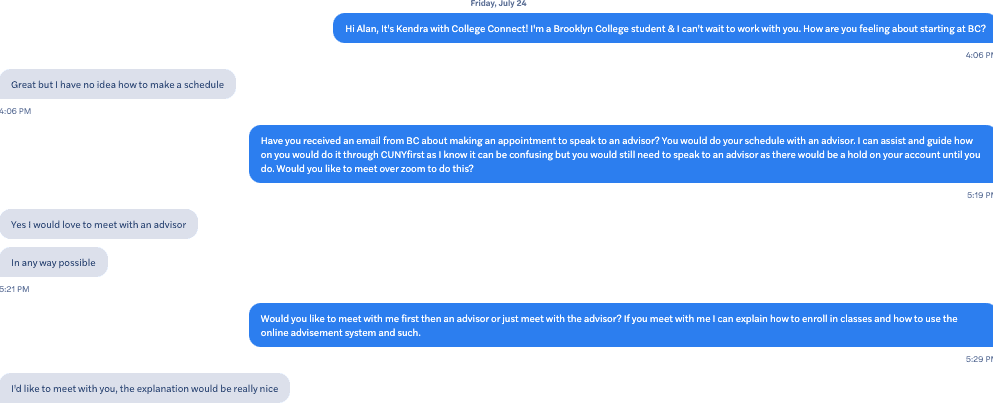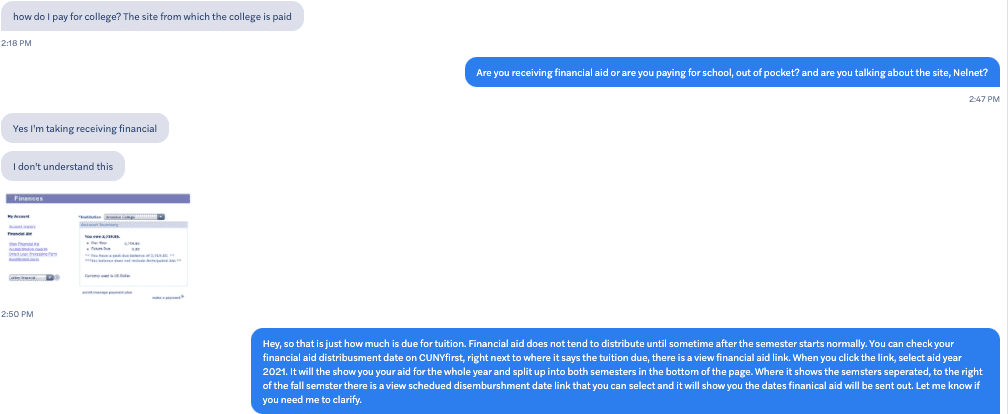The Pilot
With generous support from the Bill & Melinda Gates Foundation and in partnership with four campuses of the City University of New York, CARA is trying out a new high school-to-college bridge programming model to help keep college-bound students on course.
Near-peer bridge programs, like CARA’s long-running College Bridge, typically hire and train college students to work in their high school alma maters as “coaches” to high school seniors who plan to go to college — guiding seniors over the course of their final year and the following summer through the application process and various other tasks, like completing financial-aid forms, registering for classes, and preparing for the social-emotional challenges of the college transition.
But CARA’s new pilot program, called College Connect, is different.
Launched in summer 2020, College Connect moved the focus from high schools to colleges. Unlike traditional bridge programs, where coaches support a single class of seniors pursuing a wide variety of postsecondary plans at different colleges and alternative options, in this pilot program, CARA coaches worked with students planning to attend the same CUNY colleges as their coaches. College Connect’s design also ensured that coaches continued to support their students through their first year of college.
As in all of CARA’s programs, many coaches and students are the first in their families to attend college. And as numerous studies have shown, the benefits of peer leadership are vast. Students are often more likely to build a rapport and take guidance from someone with whom they can closely relate, and peers can offer a sense of community and connection that goes beyond what adult staff members are able to provide.
Our partner schools were two four-year institutions — Brooklyn College (BC) and City College of New York (CCNY) — and two two-year institutions — Borough of Manhattan Community College (BMCC) and Bronx Community College (BCC). On each of these campuses, we had strong support from the enrollment department and leadership. They identified New York City public school students who had pledged to enroll in the spring but were considered at high risk of not starting in the fall. Then they sent emails and text messages inviting those students to participate in a one-on-one virtual summer support program. Nearly 700 students from across the four campuses participated.
We brought on eight coaches — two per campus. Enrollment staff at each college met directly with these coaches to provide training on school-specific milestones and requirements.
This allowed coaches to give students more targeted support: When students had issues that coaches couldn’t solve, they were able to leverage campus connections to find answers or put students in touch with staff who could assist them. This model also gave our team better access to administrative resources and student-level data — like FAFSA verification and course registration status — so we could more effectively support students.
These campus connections were key, since coaches weren’t able to meet students in person amid the pandemic. Researchers have noted a “lack of overall impact of text-based outreach when coming from a person and/or organization with whom the student has no personal connection.” (Castleman, 2020). But since the initial outreach to students came via the college itself, and the coaches — who had several years of experience as coaches — were so closely associated with the college, students seemed to feel more connected and engaged than they would have had the support come from an independent provider who was new to the work.
The texting platform, called Hustle, was also essential to the work. It allowed coaches, whose caseloads ranged from 75 to 100 students, to interact with their assigned students virtually.
Using this platform, coaches sent personalized mass messages to students and also had individualized, one-on-one conversations with them. Weekly reminders kept students on track with upcoming tasks and important deadlines, and check-in texts and messages of support encouraged student interaction. With almost all participating students responding to at least one text message, it was clear that this support was important and appreciated. We know that a feeling of belonging on campus is central to student success, so having these connections before even entering college was a major bonus for incoming freshmen. The results of the pilot back this up, as we found that participating students were more likely to enroll in the fall than those who weren’t in the program (but more on that later).
Over the summer, we helped each participating college host a virtual meetup for their incoming students to review basic enrollment information and answer questions. These meetups were extremely well-attended, with more than half of the program students tuning in.







